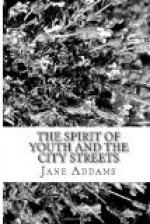The discovery of the labor power of youth was to our age like the discovery of a new natural resource, although it was merely incidental to the invention of modern machinery and the consequent subdivision of labor. In utilizing it thus ruthlessly we are not only in danger of quenching the divine fire of youth, but we are imperiling industry itself when we venture to ignore these very sources of beauty, of variety and of suggestion.
CHAPTER VI
THE THIRST FOR RIGHTEOUSNESS
Even as we pass by the joy and beauty of youth on the streets without dreaming it is there, so we may hurry past the very presence of august things without recognition. We may easily fail to sense those spiritual realities, which, in every age, have haunted youth and called to him without ceasing. Historians tell us that the extraordinary advances in human progress have been made in those times when “the ideals of freedom and law, of youth and beauty, of knowledge and virtue, of humanity and religion, high things, the conflicts between which have caused most of the disruptions and despondences of human society, seem for a generation or two to lie in the same direction.”
Are we perhaps at least twice in life’s journey dimly conscious of the needlessness of this disruption and of the futility of the despondency? Do we feel it first when young ourselves we long to interrogate the “transfigured few” among our elders whom we believe to be carrying forward affairs of gravest import? Failing to accomplish this are we, for the second time, dogged by a sense of lost opportunity, of needless waste and perplexity, when we too, as adults, see again the dreams of youth in conflict with the efforts of our own contemporaries? We see idealistic endeavor on the one hand lost in ugly friction; the heat and burden of the day borne by mature men and women on the other hand, increased by their consciousness of youth’s misunderstanding and high scorn. It may relieve the mind to break forth in moments of irritation against “the folly of the coming generation,” but whoso pauses on his plodding way to call even his youngest and rashest brother a fool, ruins thereby the joy of his journey,—for youth is so vivid an element in life that unless it is cherished, all the rest is spoiled. The most praiseworthy journey grows dull and leaden unless companioned by youth’s iridescent dreams. Not only that, but the mature of each generation run a grave risk of putting their efforts in a futile direction, in a blind alley as it were, unless they can keep in touch with the youth of their own day and know at least the trend in which eager dreams are driving them—those dreams that fairly buffet our faces as we walk the city streets.




